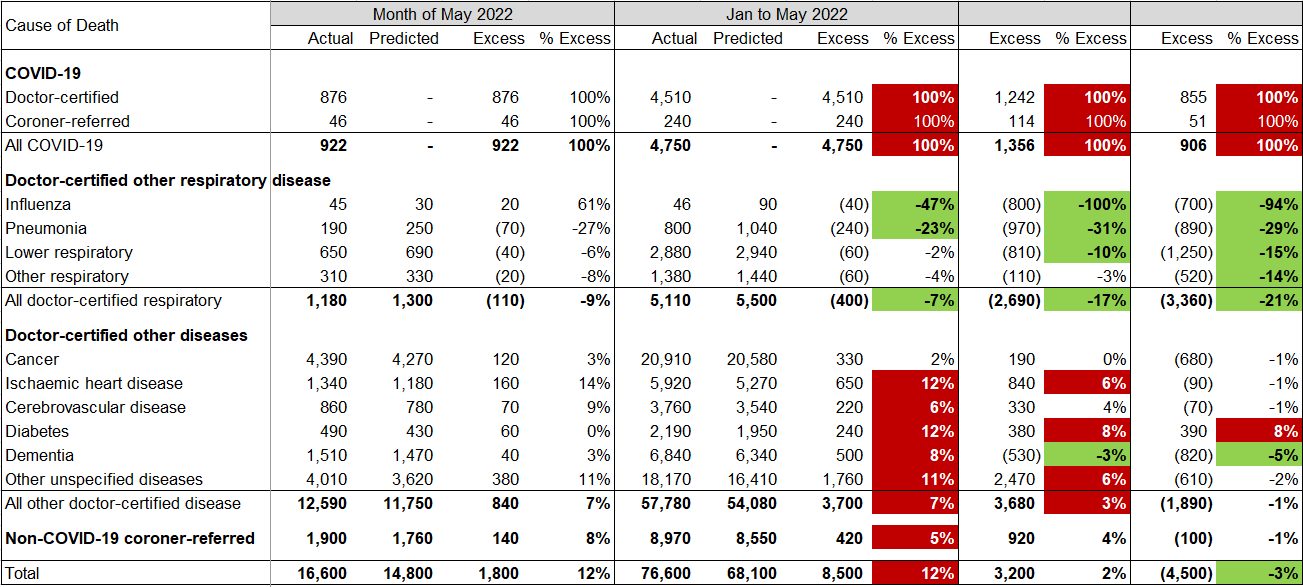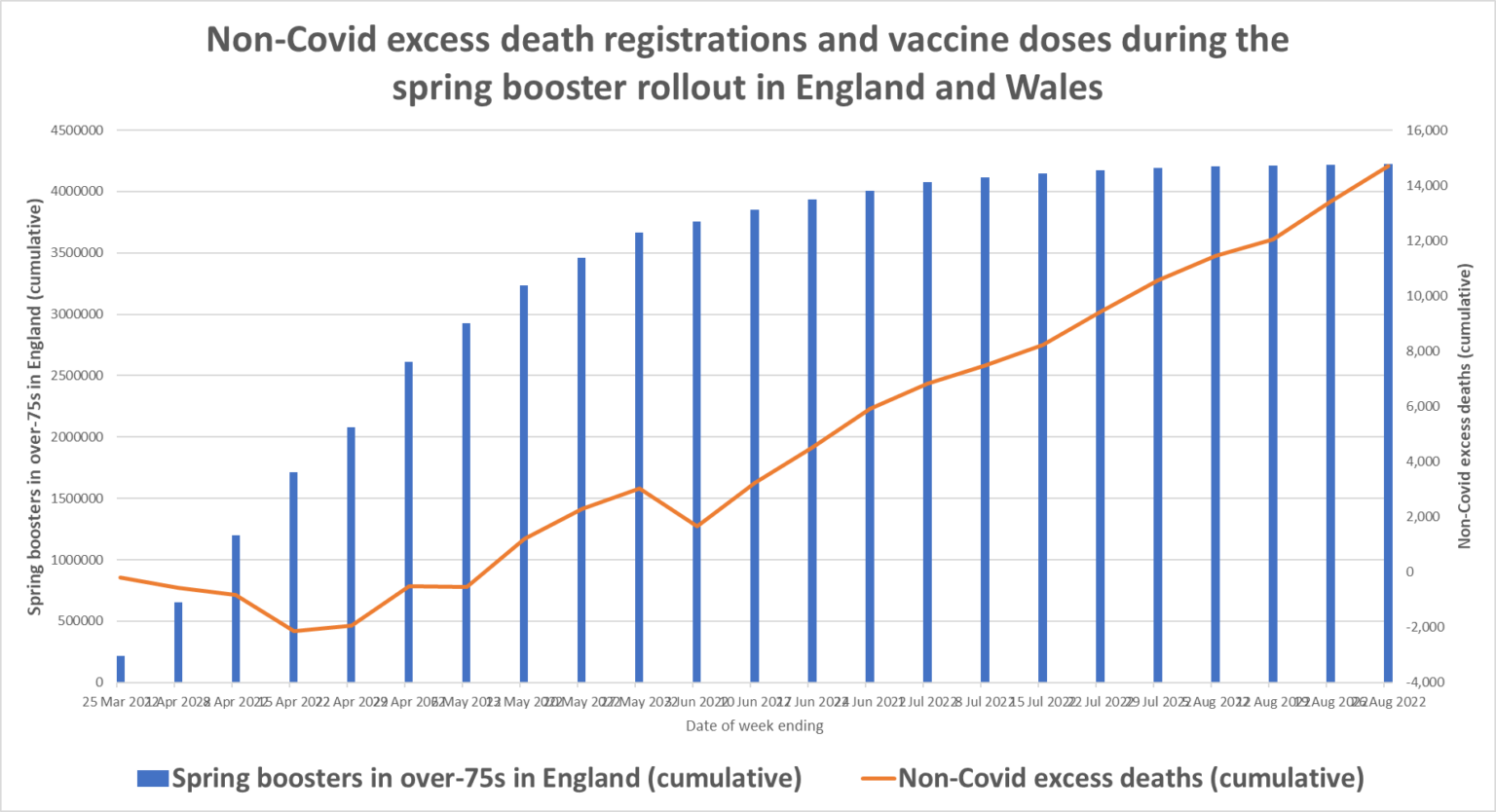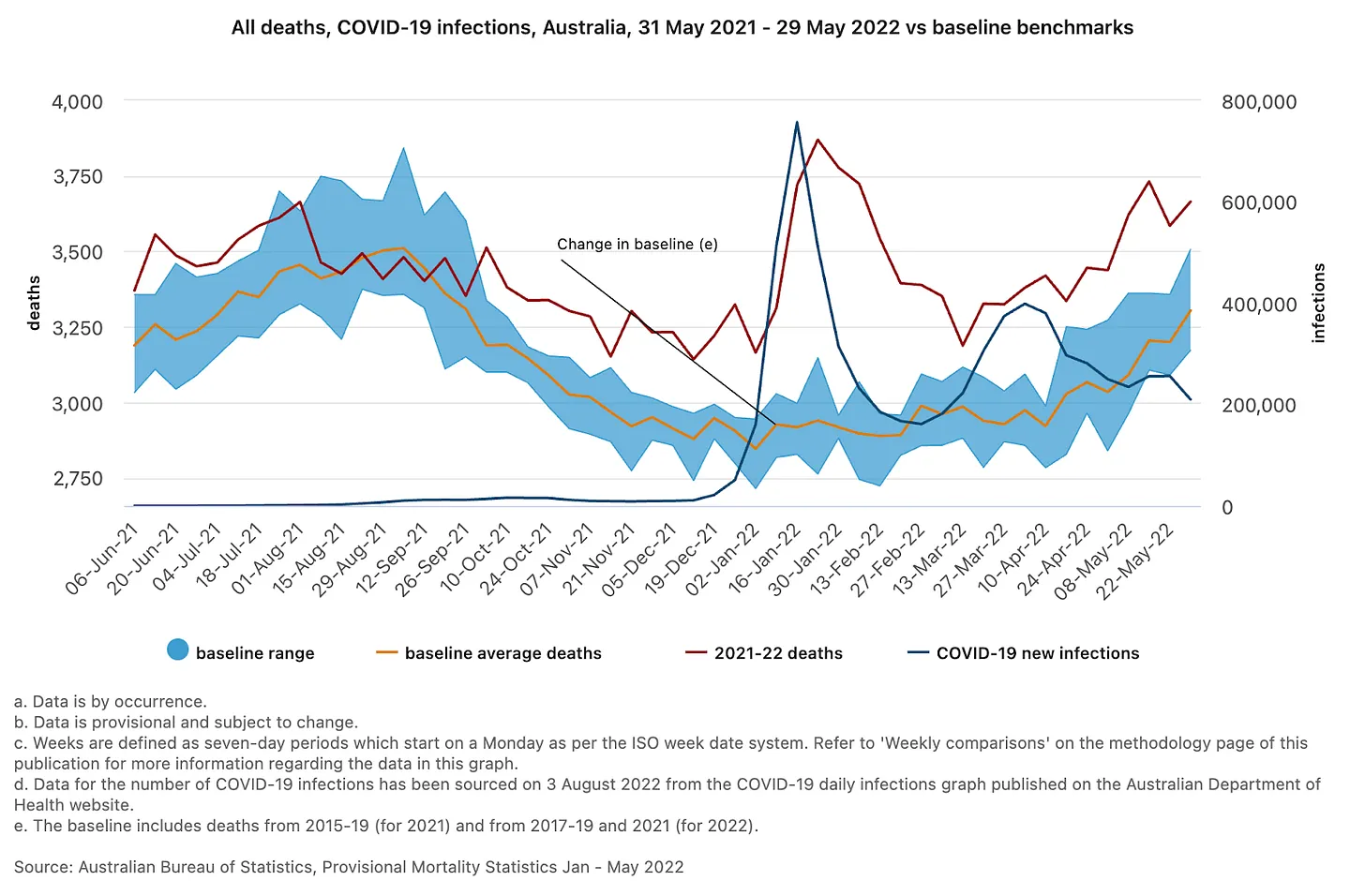
Moderators: Elvis, DrVolin, Jeff




COVID-19 Vaccine Boosters for Young Adults: A Risk-Benefit Assessment and Five Ethical Arguments against Mandates at Universities
...
University booster mandates are unethical because: 1) no formal risk-benefit assessment exists for this age group; 2) vaccine mandates may result in a net expected harm to individual young people; 3) mandates are not proportionate: expected harms are not outweighed by public health benefits given the modest and transient effectiveness of vaccines against transmission; 4) US mandates violate the reciprocity principle because rare serious vaccine-related harms will not be reliably compensated due to gaps in current vaccine injury schemes; and 5) mandates create wider social harms. We consider counter-arguments such as a desire for socialisation and safety and show that such arguments lack scientific and/or ethical support.
stickdog99 » 10 Sep 2022 02:48 wrote:Dr. Carl Heneghan and Dr. Tom Jefferson: Australian Excess Deaths
Early lockdowns and strict border measures meant Australia was largely covid-free until the end of 2021. As global cases rose, deaths increased, and restrictions were imposed, most Australians led near-normal lives. But as borders reopened, the covid case rate took off. With over 10 million cases, Australia currently has a higher case rate than the UK.
The New York Times reported how Australia saved thousands of lives while covid killed a million Americans. So surely these closures were worth it? With this in mind, we looked at the Australian stats on all-cause mortality.
The Australian Bureau of Statistics (ABS) provides provisional death data on all causes and leading causes of death and changes associated with covid. Reports are released once the majority of deaths have been registered and reported.
The critical ABS results report:
From June 2021 to May 2022, there were 16,467 more deaths than normal in Australia;
5,619 of these were attributed to covid, and 10,848 were not explained and weren't covid.
The ABS also tracks the number of deaths against historical averages.
In May, 16,124 deaths occurred: 1,922 (13.5%) above the historical average.
In 2022, 75,593 deaths occurred by 31 May: 10,757 deaths (16.6%), more than the average.
Deaths due to dementia were 20.5 percent above the average for the year to May; cancer was 6 percent above, and diabetes was 20 percent higher.
So how does Australia record a COVID death?
The Director of the Mortality Data Centre, Lauren Moran, of the Australian Bureau of Statistics, confirmed in an email response to one of our collaborators that ‘the ABS does not code any death within 28 days of a positive SARS-CoV-2 test as a death due to COVID-19.’
The conditions are taken from the death certificate. Death due to COVID-19 is defined as a death resulting from a clinically compatible illness in a probable or confirmed COVID-19 case unless there is a clear alternative cause of death that cannot be related to COVID disease (e.g. trauma). Also, there should be no period of complete recovery from COVID-19 between illness and death.
What does this mean
More than 80% of Australia’s total Covid deaths happened in 2022, and the proportion who have died with Covid - rather than due to - is rising.
We may quibble about the exact number of excess deaths, but there is no doubt that Australia has significant excess, not due to COVID (for every covid death, there are two unexplained non-covid deaths). The precise driver of the increase is unclear. But rises in dementia deaths point to a relaxing of care or downright abandonment. The increase in diabetes mortality suggests routine evidence-based care has been deserted.
The COVID and excess deaths diverge completely after early 2022, as the figure shows. Australia has the same problem as Europe, but is anyone taking notice?
To all those journos out there, making comparisons amid the pandemic is unwise. It infers that one country's strategy is better than another - it isn’t. And as we have learnt - it isn't over until it's over.
One in four Primary Health Care nurses plans to quit
Media Release 17 February 2022
More than a quarter of all Primary Health Care (PHC) nurses in Australia say they are planning to leave their job, according to new national data.
As a result, Australia is at risk of not having enough suitably-trained PHC nurses to staff aged care homes, general practices, and other primary health care settings in coming years.
The survey of 1061 PHC nurses by the Australian Primary Health Care Nurses Association (APNA) found that:
More than four in five (80.4%) primary health care nurses said they felt exhausted at work
More than four in five (86.7%) primary health care nurses said they felt stressed at work
More than three quarters (78.8%) of primary health care nurses said they felt burnt out at work
Nearly three quarters (72.9%) of primary health care nurses said they worked too much
More than three quarters (76.4%) of primary health care nurses said they worked overtime
More than one in four (28.73%) primary health care nurses are planning to leave their current job within the next two-five years
After spending two exhausting years helping patients and those they care for manage the impact of COVID-19, nurses in aged care homes, general practices, schools, and correctional facilities are chronically shorthanded. Thousands of PHC nurses have themselves contracted COVID or are furloughing following contact with the virus.
There is a solution.
Bringing nursing students into primary health care settings to carry out supervised activities has the potential to help release the pressure on PHC nurses, whilst enriching the student's skillset, and establishing a pipeline of new, skilled, and experienced PHC nurses for the future.
The COVID pandemic has left many thousands of nursing students at risk of being unable to graduate due to clinical staff shortages, preventing them having the clinical placements required to graduate.
If not urgently addressed, this increasing backlog of nursing students will mean Australia will not have enough trained PHC nurses to staff aged care homes, general practices, and other primary health care settings in coming years.
However, an innovative APNA-run nursing student placement program is allowing nursing students to play a vital role in the COVID response while simultaneously accruing their essential clinical placement time. Under the supervision of experienced primary health care nurses, it is hoped that the program will also help secure a pipeline of well-trained and highly experienced PHC nurses for decades to come.
Universities and TAFEs have traditionally found it difficult to place students in primary health care settings, However, this APNA program makes it easier, meaning students are less-reliant on hospital-based placements.
There are already 118 Victorian and 19 interstate organisations registered with APNA's student nurse placement program. Building this program so that it can be coordinated nationally would provide a workforce pipeline of motivated and skilled nurses who could help alleviate the staffing crisis in aged care homes, general practice, and other primary health care settings across the country.
Placing more student nurses in primary health care settings to carry out supervised learning and skills training would also support higher rates of screening for chronic disease which is forecast to increase due to COVID-19.
APNA looks forward to working with governments, health departments, and universities and TAFEs across the country to ensure Australia has a large-enough workforce of PHC nurses to meet future needs for decades to come.
<ends>
QUOTES FROM KAREN BOOTH, APNA PRESIDENT
“Primary health care nurses have performed almost superhuman efforts to keep the community as safe as possible from the COVID pandemic. But while health authorities recruited extra staff and provided extra resources to help with hospital admissions, they forgot the primary health care sector.
“Primary health care nurses work in general practice, in our schools, in community or correctional health, in rural and remote areas without a hospital, and in the resource-stretched aged care sector. These health care professionals have been left wondering -- where is their back up, their extra resourcing?
“The latest moves to bring forward booster shots and end COVID restrictions were the final straw. This has severely impacted the primary health care nurse workforce, with thousands of sick nurses furloughing, leaving an intolerable workload on those nurses who remain.
“Our primary health care nurses desperately need help, and nursing students - many thousands of whom find themselves unable to get the clinical placement experience they need - are a ready-made solution.
“Nursing students can be utilised in primary health care to triage patients, help with health checks, and help registered nurses with vaccine clinics and other clinical activities.
“More importantly, supervised student nurses, using approved scripted checklists, could do welfare calls to people at home who are sick with COVID, and escalate treatment to registered nurses or general practitioners as needed.
"What better way can there be to build the skill-set and professional capability of student nurses, and strengthen capacity in primary health care services, than to actively involve them in the greatest health challenge of recent times?”
QUOTES FROM MAREE LANSDOWNE, STUDENT NURSE SUPERVISOR, BREED STREET CLINIC, TRARALGON
“COVID has overwhelmed our clinic - we have been incredibly swamped by patients. Nurses are the ones in the front line who deal with people seeking help when they are confused about COVID vaccines and boosters and when the rules change.
“It is great experience for students such as Irene to be in this situation to see how we cope under such duress and how important it is to work together for the same thing to the same end for the same outcome. She will remember our learning experience forever.”
QUOTES FROM IRENE THORSON, 2ND-YEAR MONASH UNIVERSITY NURSING /MIDWIFERY STUDENT
"I really enjoyed the student nursing placement, more than I expected to. I learned so much. Being in there and learning the practical things freed up the nurses to handle more of the responsibilities they had.
“I was given quite a bit of responsibility and trust – I helped with patient screening, health histories, blood pressure monitors, ECGs – the things that take time.
“You go in expecting to being thrown in the deep end, but when I actually got in there, I understood just how important primary health care nurses are. The nurses deal with a lot of normal responsibilities such as health screenings and wounds, as well as being overrun with COVID vaccinations. That's a whole new job for them but they don’t have any extra staff to do it.”
<ENDS>
*ACCORDING TO APNA’S AUGUST 2021 PULSECHECK SURVEY:
Almost half of PHC nurses were undertaking less chronic disease and healthy ageing management activity in August 2021 compared to May 2021
Almost half of PHC nurses were undertaking less preventative health and screening activities in August compared to May 2021
This is your reminder to check in on your healthcare worker mates
Across Australia, healthcare workers have been stretched to their physical and mental limits.
Erin Cook
August 3, 202211:00am
While most Australians have been able to resume business as usual, our nurses and doctors are burnt out and fed up.
We’re now in year three of the Covid-19 pandemic and with case numbers still worryingly high, health workers across both public and private systems across Australia are stretched to their limit and struggling to cope.
Two days ago, an Australian healthcare worker kicked off a conversation on the r/Australia Reddit forum called: “Healthcare workers in Australia are not ok.” At last count, the thread has over 500 comments, mostly from fellow healthcare professionals sharing their stories of staff shortages, declined annual leave requests and flat-out exhaustion. Many healthcare workers are fed up and looking for work elsewhere.
Image: Reddit
One nurse said: “My colleagues are leaving in droves. Literally day by day another person leaves. Out of the profession for good, most with 6 or more years of service. Nothing incentivises them, either, no overtime, no fatigue pay. Nothing. I am studying to leave and staying on my maternity leave for literally as long as I can (2 years) and never coming back. My mum is a nurse educator in her late 40s and she has genuinely considered early retirement - a woman who lives and breathes nursing. She told me never to come back.”
Image: Reddit
Doctors are under the same pressure, another Reddit user pointed out: “Doctor here. I'm not renewing my contract, and I know many others who are doing the same. I'll float around, pick up the odd shift, but my sleep schedule has suffered too much. We've had nurses leave in droves, and while it's slightly harder for doctors to leave because of training pathway requirements, so many of my colleagues are doing the same as me. I've cared so much, but I need to care for myself.”
Overall, there is one worrying consensus from the healthcare workers that have contributed to the thread: Australia’s health system is buckling under pressure.
Image: Reddit
One Reddit user feels let down that the government didn’t plan ahead more strategically: “I am also annoyed there wasn’t more of a strategic effort. In 2020 it was clear this wasn’t going away anytime soon. We did what we were told - we isolated, we wore masks, we checked in etc etc. all while assuming that there was a bigger and better plan of better tests, vaccines and treatments and strategic investments.
“And we get here and it just turns out, nope we were just holding on and waiting to get through. It’s wave five hundred now and the bigger and better plan wasn’t a thing.”
One glance at the thread and the message is clear: our healthcare workers are struggling. There’s never been a more important time to check in on your healthcare worker mates.
#152. NOVELIST
Considering that most of those who have fallen for the propaganda are well-educated, left-leaning people, I present myself as being in their group. While speaking casually or writing (I'm a novelist and a philosopher of science), I act as though “everybody knows” what I know and I use humor to gently mock those who don't know. I might say something provocative as an aside and then change the subject to something else. I might bring up the topic while talking about seemingly unrelated things—- for instance this lecture I gave in Czechia this summer. https://www.youtube.com/watch?v=1mYG0ep2_JQ&t=16217s
At least half the people who go along with the official narrative do so because they don't want to be in the out group; they do not want to be ridiculed. Most well-educated, professional people are where they are because they are good at going along and doing what's expected of them. The group is heavily biased toward conformity.
If conformists get any sense that the wind is changing direction, they will be first to change course and pile on with the new in-group.
Start playing the member of the hip crowd.
Culture, art, music, philosophy, literature is going to be especially important in swinging this ship around. I'm a novelist and I understand how propaganda works. I use rhetorical devices to work on the sub-conscious level. Currently working on this: https://vnalexander.com/2021/11/25/prev ... e-musical/
New Zealand drops mask and vaccine mandates in sweeping Covid changes
Jacinda Ardern says it is time to ‘turn the page’ on the pandemic as she scraps all but a handful of restrictions
Australian Associated Press
Mon 12 Sep 2022 01.32 EDT
Jacinda Ardern has declared it “time to safely turn the page” on New Zealand’s Covid-19 restrictions, scrapping all but a handful of remaining rules.
New Zealand, which once eliminated the virus through the toughest pandemic rules in the world, has made relaxations similar to Australian or European conditions.
Mask-wearing will no longer be mandatory in public places, and the last vaccine mandates will be ditched in two weeks under sweeping changes announced by the prime minister on Monday.
However, the government is sticking by a seven-day isolation period for people with virus, defying calls to shorten isolation to five days.
...
“Today marks a milestone in our response. Finally, rather than feeling that Covid dictates what happens to us, our lives, and our futures, we take back control,” Ardern said.
“The most recent health advice now tells us that with the lowest cases and hospitalisations since February, our population well vaccinated, and expanded access to anti-viral medicines, New Zealand is in a position to move forward.
“We move forward with confidence knowing that we’re not going to use those measures in the future.”
Users browsing this forum: No registered users and 4 guests